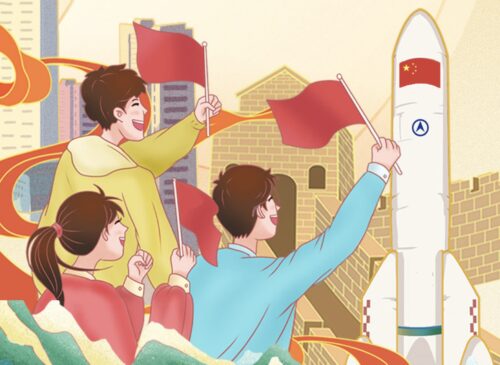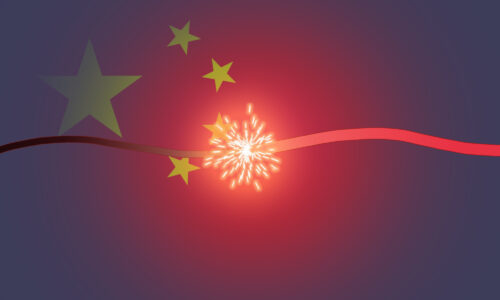Did silver cause China’s decline? ‘Empire of Silver,’ reviewed
A new book by Jin Xu (translated by Stacy Mosher) argues that imperial China's choice of currency curtailed its development during the Industrial Revolution, and led to collapse.

Even those of us with a fierce interest in China might require a certain wonkishness to read a book about the nation’s monetary history. But worry not. Empire Of Silver is a superb exposition of the deep-rooted intertwining of politics, financial policy and Chinese history. It may be well-known that paper currency first emerged during the Song dynasty — but what might be less familiar are the recurring economic forces that led to its adoption and abandonment, and how these very forces helped lead to the decline and collapse of entire dynasties.
Jin Xu — the editor of the Chinese edition of the Financial Times — also explains how silver, rather than gold, subsequently came to be the currency standard for half a millennia, despite China producing very little of the precious metal, how and why a mature banking industry failed to emerge, and hence why the nation failed to “take off” at the time of the Industrial Revolution, despite having all the ingredients in inchoate form.
These are not small-order topics, and both Xu and translator Stacy Mosher assume a certain financial literacy, through references to arbitrage, fiat currencies, and seigniorage. (I’ll confess that I had to look that last one up.) Xu, however, keeps the reader’s interest through a sustained narrative: this isn’t so much a piecemeal tour through the various issues and periods as a cogently argued dissertation on the importance of China’s financial institutions and culture on its broader history.
China’s first paper currency developed during the Tang dynasty from promissory notes called “flying cash.” By the Song dynasty, Sichuan merchants were using private exchange notes called jiaozi, glad to be excused the inconvenience of unwieldy iron coins. However, a recurring problem was that, without independent institutions, governments were prone to issuing excess amounts of currency when the exchequer was under strain — typically as military losses against invaders and natural disasters ravaged the tax base — leading to monetary debasement, mounting inflation, ever deepening financial crises, and dynastic collapse.
By the 14th century, then, “white gold” had replaced paper money. Xu notes, “crucially, silver was a currency immune from being rashly printed, since the imperial court had no way of ‘printing’ silver.” But China has very limited silver deposits, and so the precious metal (valued variously, as Xu rather exhaustively documents, between a tenth and a fourteenth that of gold across the nations — thus enabling arbitrage) had to be imported, initially from Japan and then from the Americas as the New World opened up. Economic expansion was dependent on sustained supplies of silver; it was the blood in the veins of the economy. Xu even suggests that “in a certain sense, it would be no exaggeration to call the Opium Wars the Silver Wars instead.” However, when Imperial Spain stopped exporting silver to Asia, the monetary shortage caused a deflationary spiral in China, compounded by disastrous crop failures, which might well have induced the end of the Ming dynasty in 1644. Qing and Republican-era monetary policies, as Chinese power waned, were even more circumscribed. Political decline precipitates financial collapse, and vice versa, in a terrible death spiral.
Is Xu’s thesis persuasive? Yes and no. Empire of Silver is the history of the world viewed through one particular prism, as indeed all histories are. But histories are also a reading of the present, whether acknowledged or not. Howard Zinn’s The People’s History Of The United States (1980), for example, came out of the leftist-revisionist 1970s, whereas Lytton Strachey’s debunking Eminent Victorians (1918) naturally followed the enormous disillusioning of the First World War. Empire Of Silver, however, steadfastly refuses to use its historical vantage to comment on the economics of the present. For instance, discussing the recurrent failures of paper currencies, Xu notes Francis Fukuyama’s suggestion that three attributes are necessary for an “orderly society,” namely “the state, the rule of law, and accountable government.” Xu merely notes that this state of affairs “is not easy to attain,” and refuses to discuss modern China’s issues with either the rule of law or accountable government. Similarly, a sentence like, “However, over time, the powerful and moneyed social strata seized the opportunity to annex more land while using official status to minimize their payment of taxes to the state,” regarding the Northern Song, is just begging for a modern comparison. But Xu simply refuses to go there.
The reason for this isn’t hard to discern. It might be politically necessary, and the refusal to tease out historical analogies might even be an eloquent expression of enforced intellectual silencing, if you’re conceptually minded. I won’t criticize Xu for her choices; it’s her life. But it does impair the book. Refusing to comment on today’s economic issues — especially when China is once more facing intensified demographic and foreign policy pressures — in the light of previous instances, or even to acknowledge such analogies, occasionally makes Empire Of Silver feel something of a castrated, timorous book. Its reading of the past is often superb, but its historical perspective is radically foreshortened, toward something like 1949, rather than 2017 (the date of its first publication in Chinese).
Similarly, on the rare occasion when Xu moves from financial to political commentary, her judgment vanishes, replaced by parroted Party slogans. Discussing the lower status of commerce in Ming dynasty China compared to the West, she quotes historian Qián Mù 錢穆: “China’s historical tradition is often able to warily grasp a low-standard economic viewpoint that puts human life first and the economy second. Therefore, when discussing economic matters, there is often a special focus on the words ‘thrift and decorum.’” She then adds:
For this reason, the Chinese government’s ideal standard for the economy is “equality,” and its ultimate criterion is “peace under heaven,” while Western history has mainly pursued “inequality.”
This is, frankly, horse shit. A simple glance at Chinese history and the modern day shows that inequality has stalked the nation as much as the West. The idea that China held back commerce out of some paternalist compassion is a myth, on par with the propagation of China as a lovey-dovey war-hating nation. The disdain of finance from Chinese emperors was not feudal benevolence but ignorance and resistance to change. The world was about to shift on its axis, leaving China backward and weakened for centuries. So much for peace under heaven. Xu’s comment is dictatorship propaganda, but says much about the Party’s self-image.
However, judged simply as a readable and enlightening book, Empire Of Silver is a valuable addition to the gold ring of worthwhile popular explainers on the Chinese economy. The nearest comparison is Eswar Prasad’s also excellent Gaining Currency (2016). That, however, was more of a historical narrative, outlining the facts of Chinese currency experiments, than a sustained thesis on the rise and fall of China’s various monetary policies, as here. For this Xu deserves great credit — despite her occasional enforced silences.
For more book reviews, see our Reading China archive.






